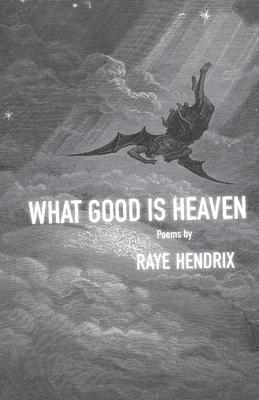Set in a rural agricultural community in north Alabama, deep in the Appalachian foothills, What Good is Heaven interrogates the complicated relationship between violence and love. Viewed through the lens of a young, bisexual woman, the poems in this collection layer a queer coming-of-age narrative with poems of witness to the difficult realities not only of rural and farm life, but of violent cultural norms based around the patriarchal religious beliefs that the region is steeped in. Like the social setting of this place, the landscape, with its dark forests and darker hollers, is a space of turbulence--of ideas butting up against each other--and those in the middle are left to sort out the wreckage. This collection is concerned with navigating that wreckage, which predominantly manifests as violence done to bodies. For the speaker of these poems, the bodily harm done to livestock and wild animals, plant life, and even the earth itself as simply part of the justifiable or "acceptable" violence of farm life comes to mirror the mirror the bodily transgression queer folks and women face in her community--violence that is similarly considered to be "acceptable." In registers that move between the religious, personal, political, and even ecocritical, What Good is Heaven asks what it means to love and be loved by what hurts you, to be implicated in perpetuating the same kinds of harm, and what it means to call such a complicated place your home.
The TRP Southern Poetry Breakthrough Series: Alabama
Set in a rural agricultural community in north Alabama, deep in the Appalachian foothills, What Good is Heaven interrogates the complicated relationship between violence and love. Viewed through the lens of a young, bisexual woman, the poems in this collection layer a queer coming-of-age narrative with poems of witness to the difficult realities not only of rural and farm life, but of violent cultural norms based around the patriarchal religious beliefs that the region is steeped in. Like the social setting of this place, the landscape, with its dark forests and darker hollers, is a space of turbulence--of ideas butting up against each other--and those in the middle are left to sort out the wreckage. This collection is concerned with navigating that wreckage, which predominantly manifests as violence done to bodies. For the speaker of these poems, the bodily harm done to livestock and wild animals, plant life, and even the earth itself as simply part of the justifiable or "acceptable" violence of farm life comes to mirror the mirror the bodily transgression queer folks and women face in her community--violence that is similarly considered to be "acceptable." In registers that move between the religious, personal, political, and even ecocritical, What Good is Heaven asks what it means to love and be loved by what hurts you, to be implicated in perpetuating the same kinds of harm, and what it means to call such a complicated place your home.
The TRP Southern Poetry Breakthrough Series: Alabama